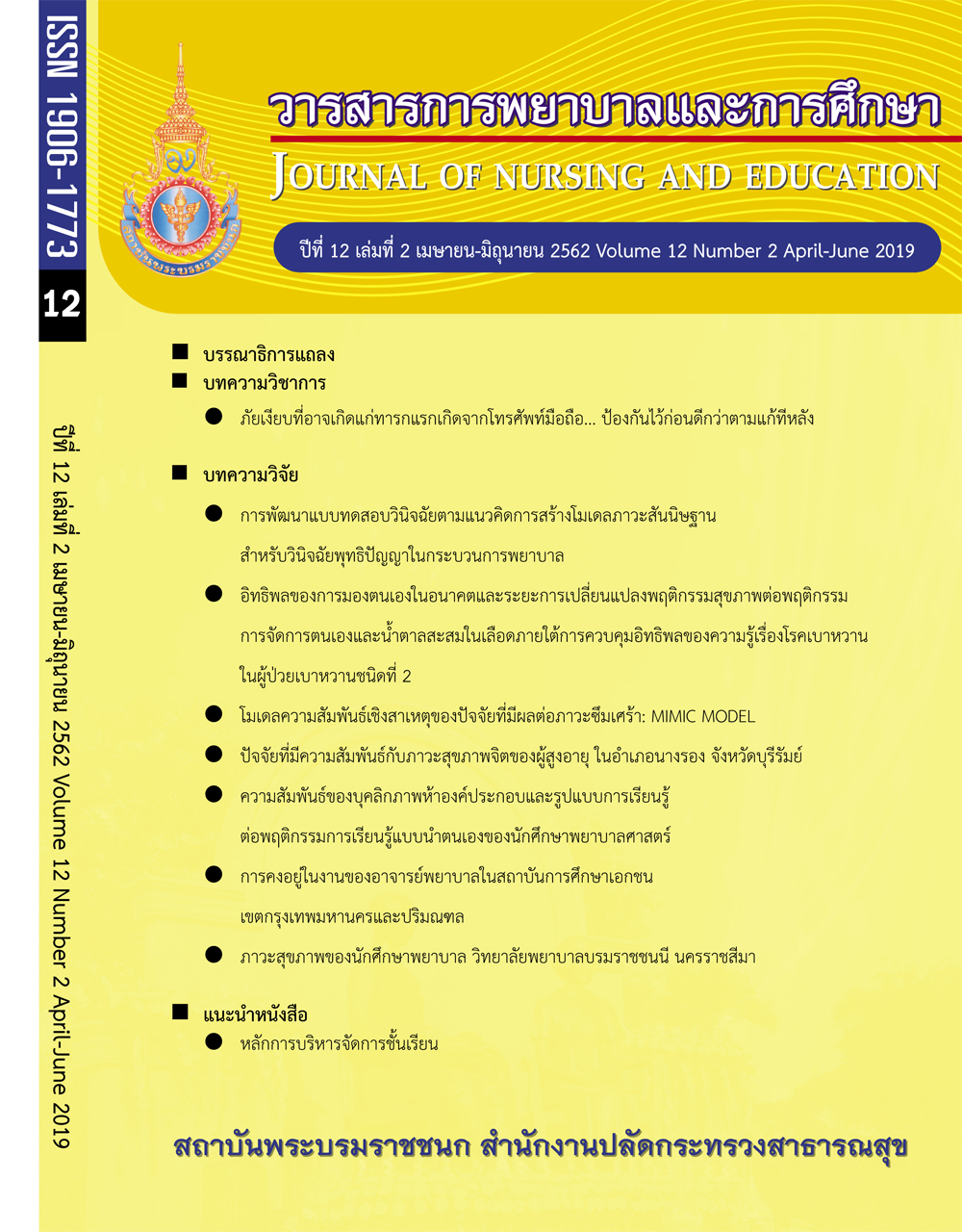ความสัมพันธ์ของบุคลิกภาพห้าองค์ประกอบและรูปแบบการเรียนรู้ ต่อพฤติกรรมการเรียนรู้แบบนำาตนเองของนักศึกษาพยาบาลศาสตร์
ความสัมพันธ์ของบุคลิกภาพห้าองค์ประกอบและรูปแบบการเรียนรู้ ต่อพฤติกรรมการเรียนรู้แบบนำาตนเองของนักศึกษาพยาบาลศาสตร์
คำสำคัญ:
บุคลิกภาพห้าองค์ประกอบ, รูปแบบการเรียนรู้, พฤติกรรมการเรียนรู้แบบนำตนเองบทคัดย่อ
บทคัดย่อ
การวิจัยเชิงพรรณนานี้ มีวัตถุประสงค์เพื่อศึกษาปัจจัยบุคลิกภาพห้าองค์ประกอบและรูปแบบ
การเรียนรู้ ที่มีความสัมพันธ์กับพฤติกรรมการเรียนรู้แบบนำตนเอง ของนักศึกษาพยาบาลศาสตร์
กลุ่มตัวอย่าง คือนักศึกษาพยาบาลชั้นปีที่ 1, 2, 3, และ 4 คณะพยาบาลศาสตร์ วิทยาลัยนานาชาติ
เซนต์เทเรซา ปีการศึกษา 2561 ทั้งหมดจำนวน 466 คน โดยเลือกแบบเจาะจง เครื่องมือที่ใช้ในการวิจัย
ประกอบด้วย แบบสอบถามปัจจัยส่วนบุคคล แบบวัดบุคลิกภาพห้าองค์ประกอบ แบบวัดพฤติกรรม
การเรียนรู้แบบนำตนเอง และแบบวัดรูปแบบการเรียนรู้ ที่ผ่านการตรวจสอบความตรงเชิงเนื้อหา
โดยผู้ทรงคุณวุฒิ 3 ท่าน และหาค่าสัมประสิทธิ์แอลฟาของครอนบาค ได้ค่าความเชื่อมั่นเท่ากับ .85, .87
และ .89 ตามลำดับ วิเคราะห์ข้อมูลโดยหาค่าความถี่ ร้อยละ ค่าเฉลี่ย ส่วนเบี่ยงมาตรฐาน และวิเคราะห์
หาค่าสหสัมพันธ์แบบเพียร์สันโพรดัคโมเมนต์ (Pearson’s Product Moment Correlation)
ผลการวิจัย พบว่า พฤติกรรมการเรียนรู้แบบนำตนเองของนักศึกษาพยาบาลศาสตร์ มีค่าเฉลี่ย
โดยรวมเท่ากับ 4.36 (S.D.=0.47) อยู่ในระดับสูง บุคลิกภาพห้าองค์ประกอบ และรูปแบบการเรียนรู้
มีความสัมพันธ์ทางบวกระดับปานกลาง กับพฤติกรรมการเรียนรู้แบบนำตนเอง ของนักศึกษาพยาบาลศาสตร์
อย่างมีนัยสำคัญทางสถิติที่ระดับ .01 (r=.49 และ r=.53) ตามลำดับ
จากผลการศึกษาครั้งนี้ ชี้ให้เห็นว่าควรส่งเสริมพฤติกรรมการเรียนรู้แบบนำตนเองของนักศึกษา
พยาบาลศาสตร์ โดยการจัดการเรียนการสอนที่สอดคล้องกับบุคลิกภาพ และรูปแบบการเรียนรู้
ของผู้เรียน เพื่อเสริมสร้างให้นักศึกษามีทักษะความคิดสร้างสรรค์ มีบุคลิกภาพแบบเปิดรับประสบการณ์
และมีรูปแบบการเรียนรู้แบบอิสระมากขึ้น
เอกสารอ้างอิง
1. Phothidara, Y. Nursing Education
Management for Student Generation Y.
Journal of Nursing Science and Health,
2011; 34(2): 61-69. (in Thai)
2. Zemke, R., Raines, C., and Filipczak,
B. Generations at Work: Managing the
Clash of Veterans, Boomers, Xers, and
Nexters in Your Workplace. New York:
AMACOM, 2000.
3. Padwang, B. and Udomluk, S. Study of
the Self Directed Learning Readiness
of Nursing Students at Boromarajonani
College of Nursing, Nakorn Lampang.
Nursing Journal of the Ministry of Public
Health, 2011; 21(2): 74-84. (in Thai)
4. Sripan, P. Relation between Big
Five Personality and Operational
Effectiveness of Retail Credit and
Collection Department of Tisco Bank
Public Company Limited. Master Project,
M.B.A (Management). Bangkok: Graduate
School, Srinakharinwirot University,
2012. (in Thai)
5. Costa, P.T. & McCrae, R.R. The NEO
Personality Inventory Manual. Odessa,
FL: Psychological Assessment Resources,
1985.
6. Grasha, A.F. Teaching with Style:
Practical Guide to Enhancing Learning
by Understanding Teaching and
Learning Styles. Pittsburg, PA: Alliance
Publishers, 1996.
7. Guglielmino, L.M. Reliability and Validity
of the Self-directed Learning Readiness
Scale and the Learning Preference
Assessment. In H. B. Long & Associates,
Expanding Horizons in Self-directed
Learning. Norman, OK: Public Managers
Center, College of Education, University
of Oklahoma, 1997.
8. Sangjeen, K. The Relationship of
Personality and Physical Attractiveness
to Social Status. Thesis of Master Degree
of Arts in Social Psychology. Bangkok:
Faculty of Psychology, Chulalongkorn
University, 2003. (in Thai)
9. Kitiya Nusant, R. Research Report
on the Pattern Learning of Students
of the Faculty of Education, Burapa
University. Journal of Education and
Social Development, 2006; 2(1): 57-
67. (in Thai)
10. Sripongplerd, P. Learning Styles and
Teaching Styles. Thaksin University
Library Journal, 2017; 6 (July 2017):
41-63. (in Thai)
11. Janepanish Visudtibhan, P. and
Disorntatiwat, P. Learning Style
Preferences of Nursing Students at
Ramathibodi School of Nursing, Faculty
of Medicine, Ramathibodi Hospital,
Mahidol University. Nursing Journal
of the Ministry of Public Health, 2015;
25(1): 70-82. (in Thai)
12. Tohkani, M.,Tohkani, D., Siriphan, S.,
& Tongkoop, B. Academic Internal
Motivation and Professional Nurses
Personality of Nursing Students in
Three Provinces of Southern Thailand.
Princess of Naradhiwas University
Journal, 2010; 2(2): 1-15. (in Thai)
13. Sanboonsong, P. Learning Styles of
Undergraduate Nursing Students of
Pathumthani University. Thai Red Cross
Nursing Journal, 2017; 10(1): 154-164.
(in Thai)
14. Photun, A. and Ngamnin, S. The Effect of
Teaching using Games Comprehension
Based on Brain-based Learning
towards Learning Achievement and
Attitudes towards English Subject of
Prathomsuksa 2 Students. The 1st
Research Conference, Rajabhat Nakhon
Sawan, 2016: 645-656. (in Thai)






